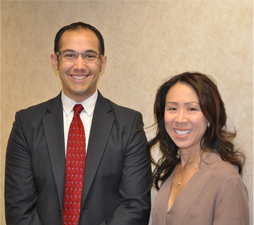© 2015 The Texas Lawbook.
By Brooks Igo
(Nov. 18) – Former Norton Rose Fulbright partner and global immigration practice leader Cindy Kang Ansbach recently announced the launch of her new boutique law firm that focuses on corporate immigration matters.
The Dallas-based law firm – Ansbach + Ghouse, PLLC – will advise domestic and international companies from a number of industries that are looking for talent outside of the U.S.
Ansbach and Jeff Ghouse, who was a senior associate at Norton Rose Fulbright, are joined by two longtime support staff.

Ansbach, who has worked in Big Law her entire career, said that having a global platform was helpful for her practice, but more and more clients are asking for a flat fee structure.
“As a firm gets larger, it is harder to provide services at an effective rate,” she said. “We are better able to serve clients at a reduced cost at a smaller firm.”
The University of Texas School of Law graduate says it is more important than ever for companies to have strong counsel on immigration matters, as the federal government is increasingly active in enforcing complex and evolving immigration rules and regulations.
A significant focus of Ansbach and Ghouse’s practice is helping companies obtain H-1B visas to hire foreign professionals with college degrees and specialized skills.
The challenge with the H-1B program is that it has an annual quota of 65,000 visas for foreign workers applying for the first time and an additional 20,000 for foreign students graduating with advanced degrees from American universities. The applications are accepted on a first-come, first-served basis starting April 1 of each year.
In the first week of applications this year, 233,000 were received, according to an article last week in The New York Times. When the number of applications for an H-1B visa quickly exceeds the quota, federal officials use a computer lottery to select the visa recipients.
About two-thirds of the applications were denied this year. Ansbach says 83 percent of her client’s applications were accepted, which she attributes to being thoroughly prepared and a little bit lucky.
The limited number of accepted applications highlights the need for H-1B and immigration reform, Ansbach says, and is not sufficient for the U.S. economy and U.S. employers.
“The lottery does not allow companies to operate on a global competitive basis,” she says. “It puts companies in a terrible position to address internal business needs.”
The best way to make sure clients are prepared, Ansbach says, is to work with employers early in the first quarter and identify their hiring needs. She and her colleagues aim to have all of their clients’ H-1B visa applications ready to go by March 31.
In the event one of her clients’ H-1B applications is not accepted, she and her team work to obtain an O-1 visa – a non-immigrant temporary worker visa given to a foreign worker who possesses extraordinary ability in the sciences, education, business or athletics – or develop a short-term strategy of getting the foreign worker approved to work in another country the company does business in.
© 2014 The Texas Lawbook. Content of The Texas Lawbook is controlled and protected by specific licensing agreements with our subscribers and under federal copyright laws. Any distribution of this content without the consent of The Texas Lawbook is prohibited.
If you see any inaccuracy in any article in The Texas Lawbook, please contact us. Our goal is content that is 100% true and accurate. Thank you.
